Looking to the Future, Today – See Us Outside, Episode 4
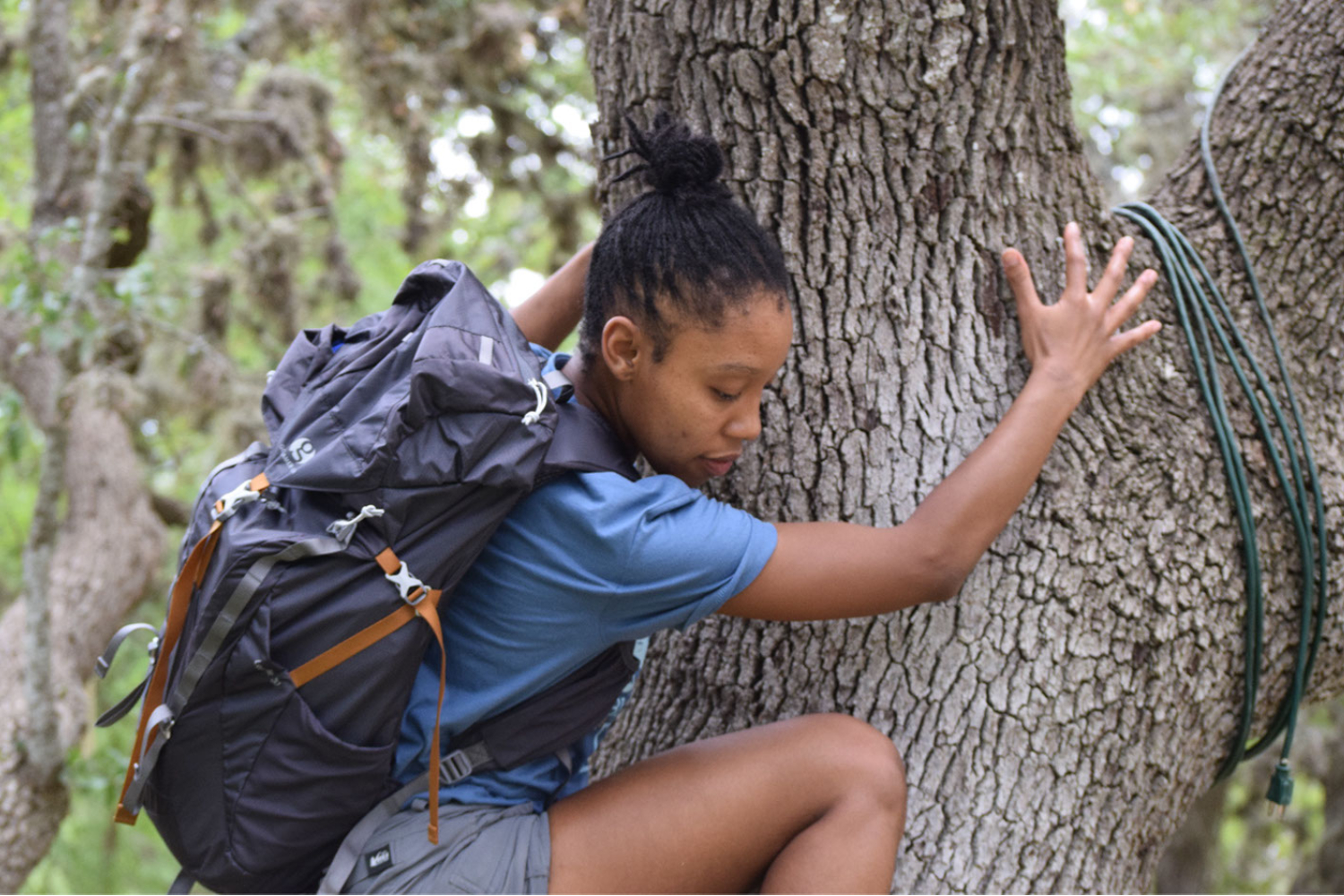
See Us Outside: Episode 4
Looking to the Future, Today
What do we hope the future of women of color in the outdoors looks like? In the final episode of See Us Outside, we hear from leaders from across the organizations doing the work to provide outdoor opportunities, as well as the outdoor community, as they share their vision as we look ahead.
Transcript available below photos and credits!
Banner image courtesy of the Charles Roundtree Bloom Project
Find the episode below, on Apple Podcasts, Spotify, Stitcher, or wherever you stream podcasts.
Featured in this episode: Karina Zavala, Alexis Krauss, Marian Perez, Adriana Guerrero, and Cristal Cisneros; Voice memo included in this episode was submitted by Denise Meeker.
Hosted by Gabaccia Moreno
A Production of Ravel Media; Produced by Gabaccia Moreno, Noël Russell, and Gale Straub.
Music by Joy Ike & Sita via MusicBed
About the series:
This special She Explores miniseries is made in collaboration with The Cairn Project, and made possible by a grant from the Walton Family Foundation.
Host Gabaccia Moreno is our guide in exploring the unique relationships girls and young women of color have with the natural world and outdoor recreation. Through the voices and stories of leaders and participants from diverse outdoor organizations doing the work to help young people of color thrive in the outdoors, this four-part audio miniseries will highlight the joy, connection, and community these girls find in nature, as well as the importance of organizations doing the work to expand outdoor opportunities.
We want to stress that when we say this series highlights women and girls of color, this is inclusive of all cis and trans women and girls, as well as folks of all gender identities who feel comfortable in spaces that center women. That said, for the most part, when we talk about gender we most often do so in terms of those who are socialized as girls and women in a more heteronormative, binary way.
Resources
- The Cairn Project
- The Cairn Project
- Organizations Highlighted
- Featured in this episode:
- Cristal Cisneros
- Ki’Amber Thompson
- Mira Manickam-Shirley
- Sarah Murray
- Alexis Krauss
- Kriste Peoples
- Karina Zavala
- Voice Memos Featured
- Host: Gabaccia Moreno
All Four Episodes of See Us Outside Are Available Now Wherever You Listen to She Explores
The opening See Us Outside Compilation includes the voices of Marinel De Jesus, Yakuta Poonawalla, Meggy Pyaneeandee, Fernanda Jardim, Arlene, Chi Pham, Denise Meeker and Doreen Wong and includes Spanish, French, Portuguese, Tagalog, Hindi, Vietnamese, Cantonese, and English.
Featured in this episode:
Kriste Peoples, Instructor Women’s Wilderness
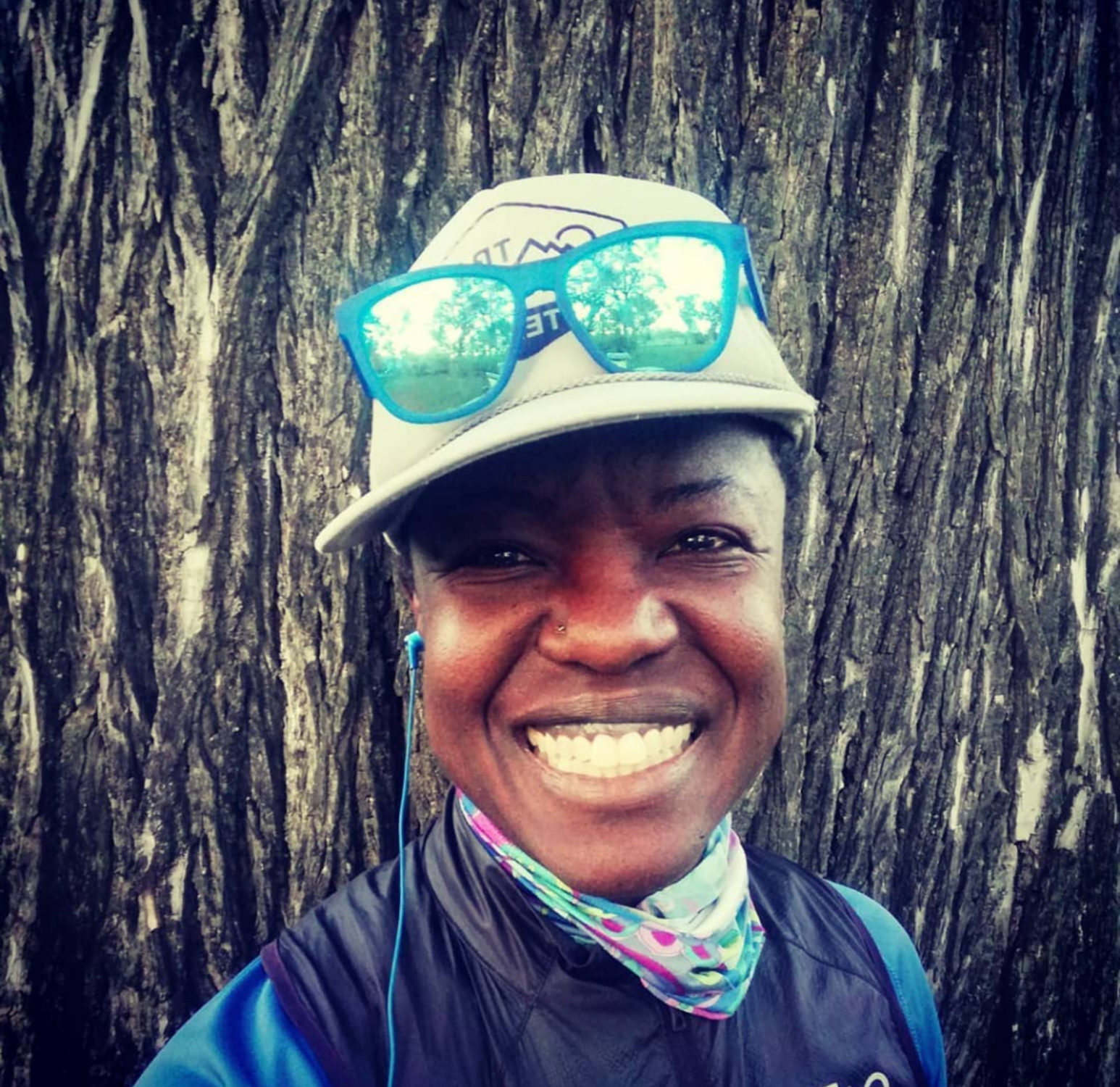
Sarah Murray, Executive Director Women’s Wilderness
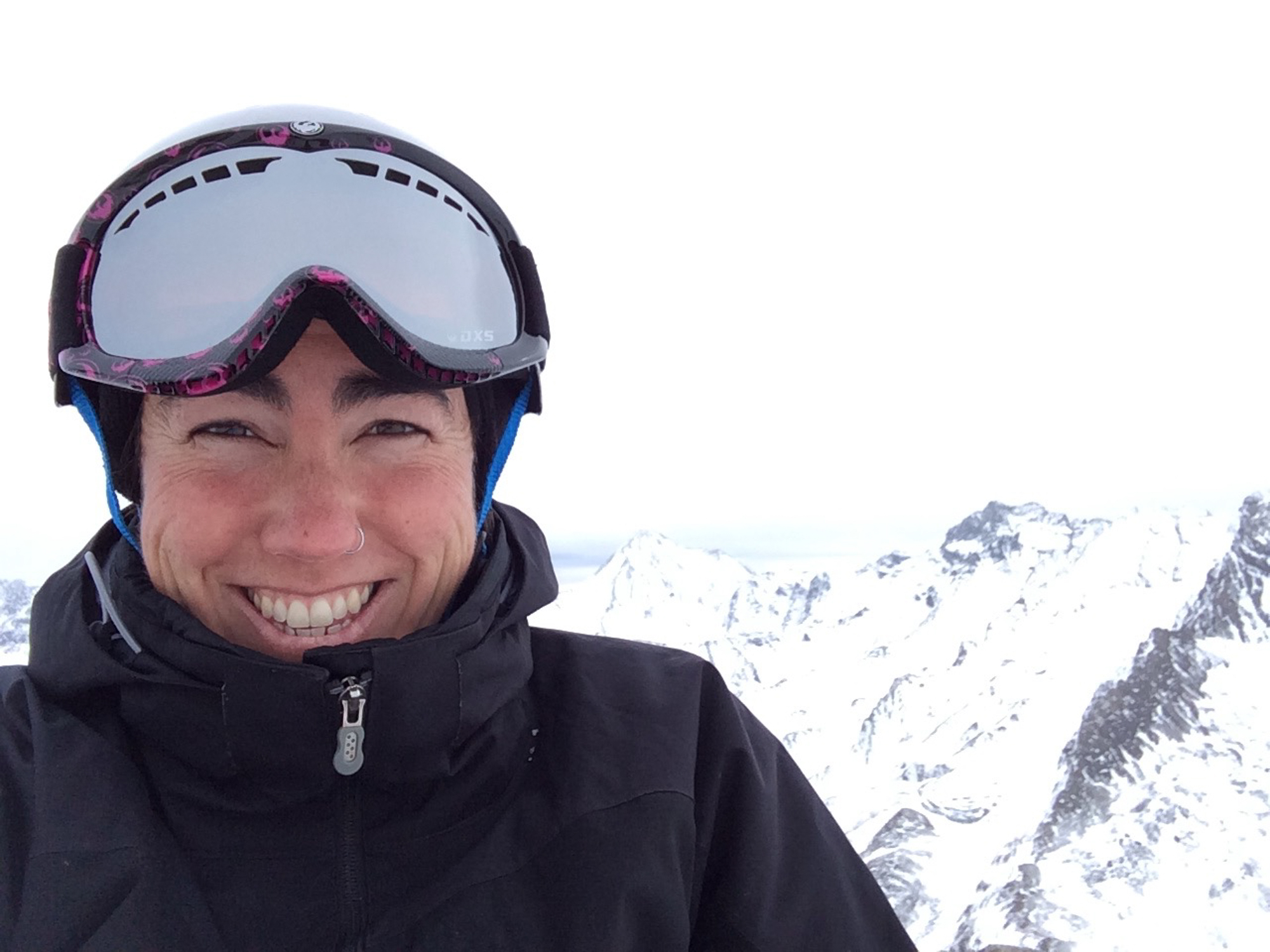
Sarah Murray
Michelle Kay
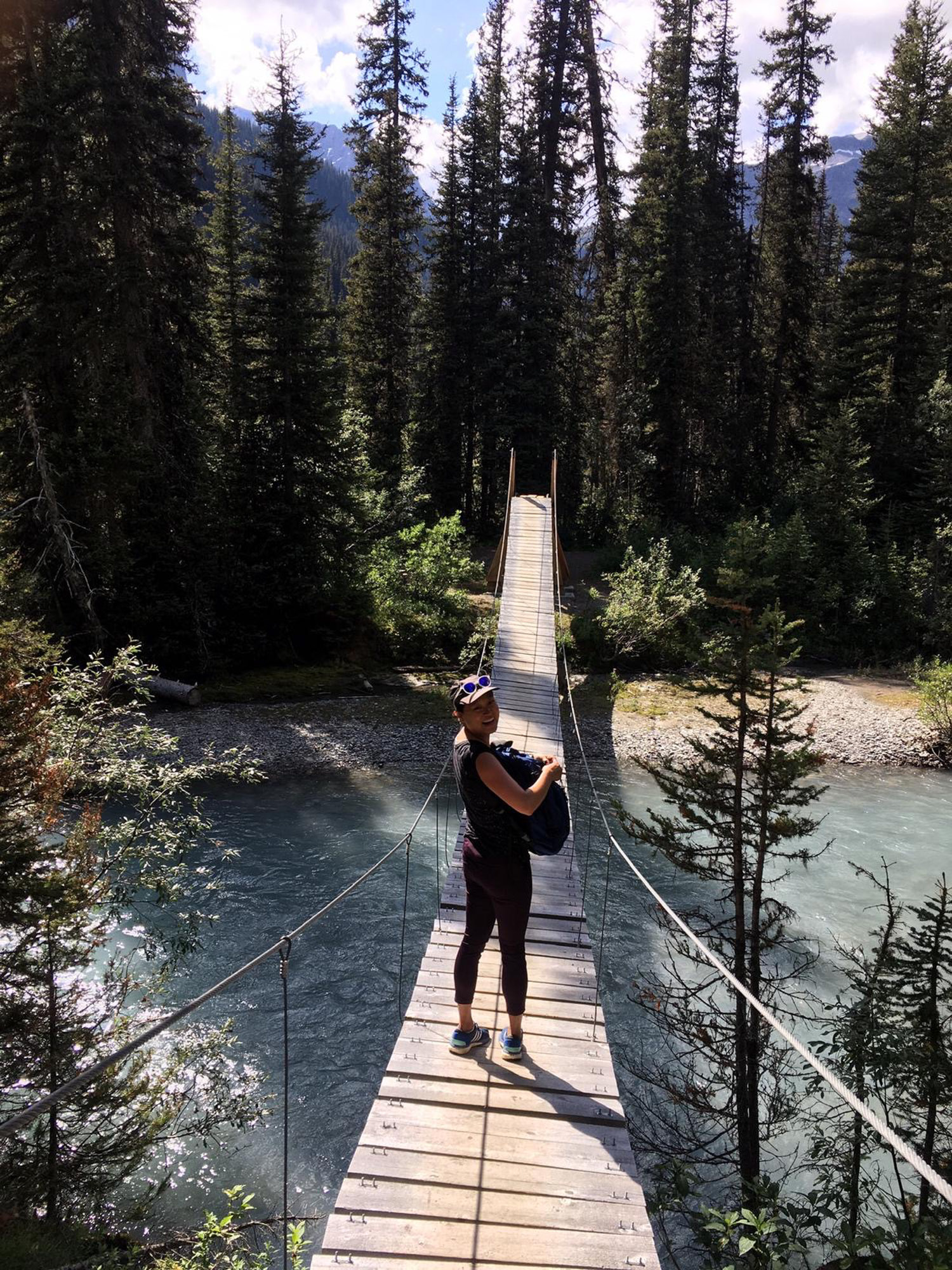
Michelle Kay @yo_mk
Brandielee Johnson
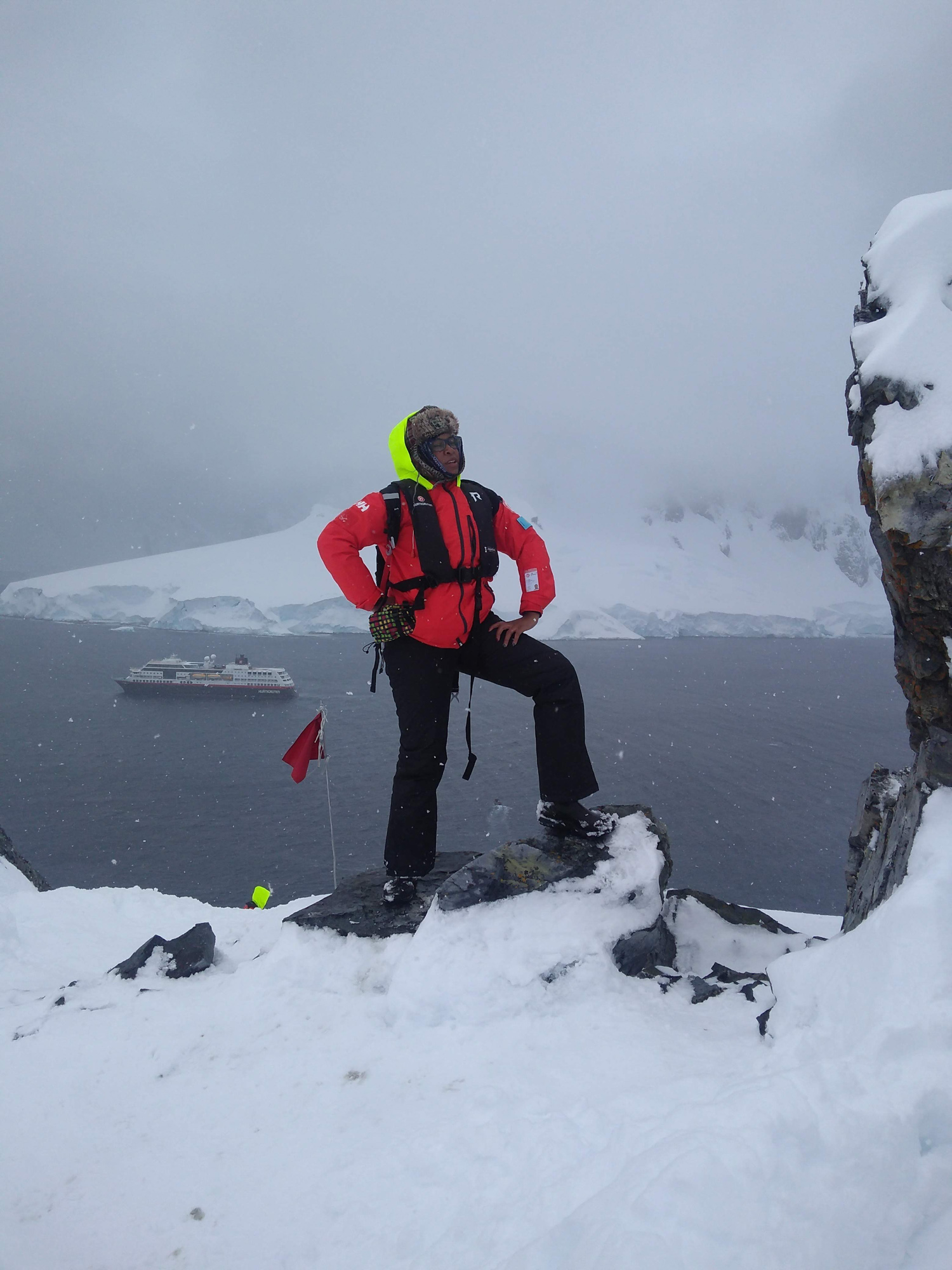
Brandielee Johnson, @thelonetraveler24
Mira Manickam-Shirley, Director Brown Girl Surf
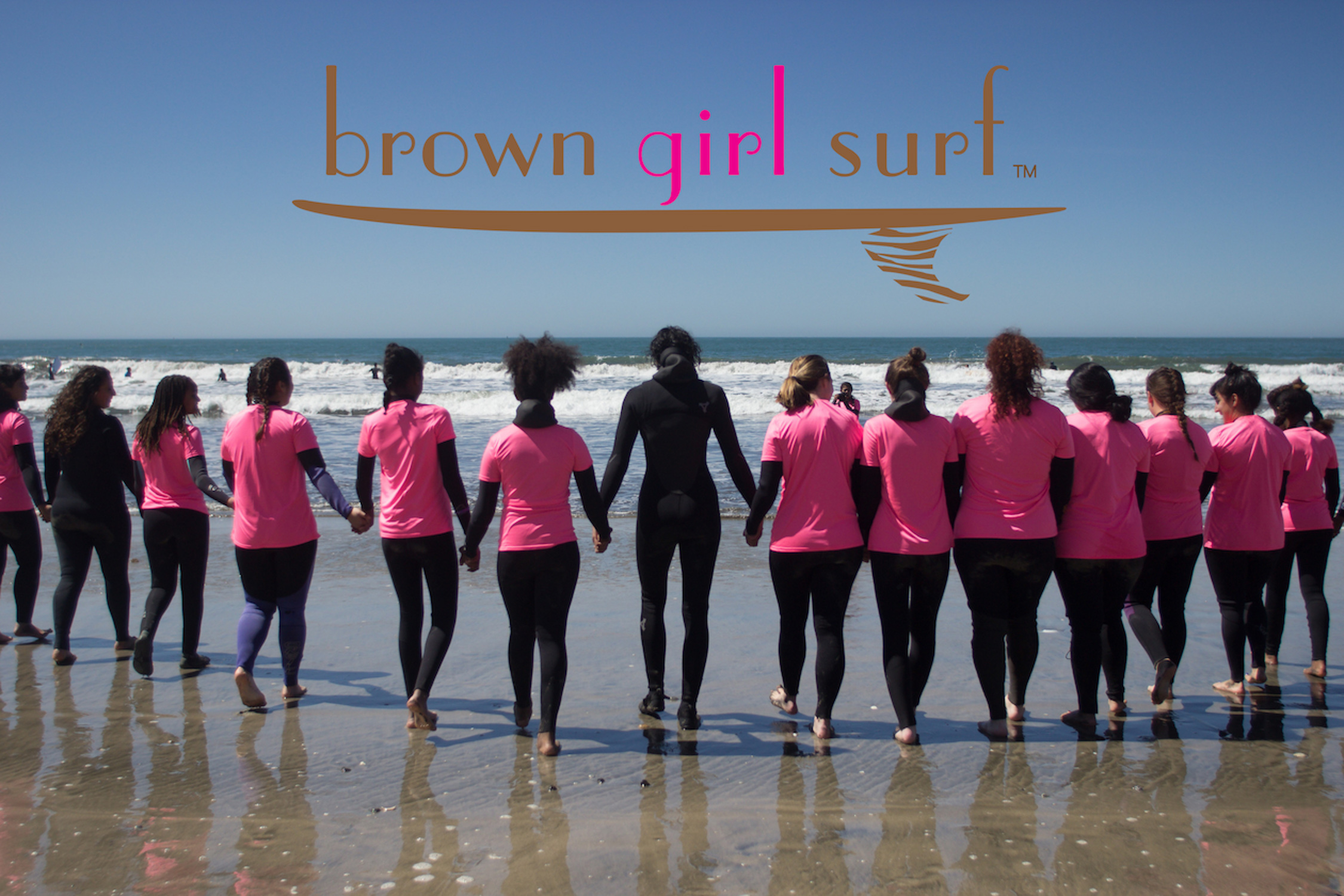
Alexis Krauss, Co-Founder of Young Women Who Crush
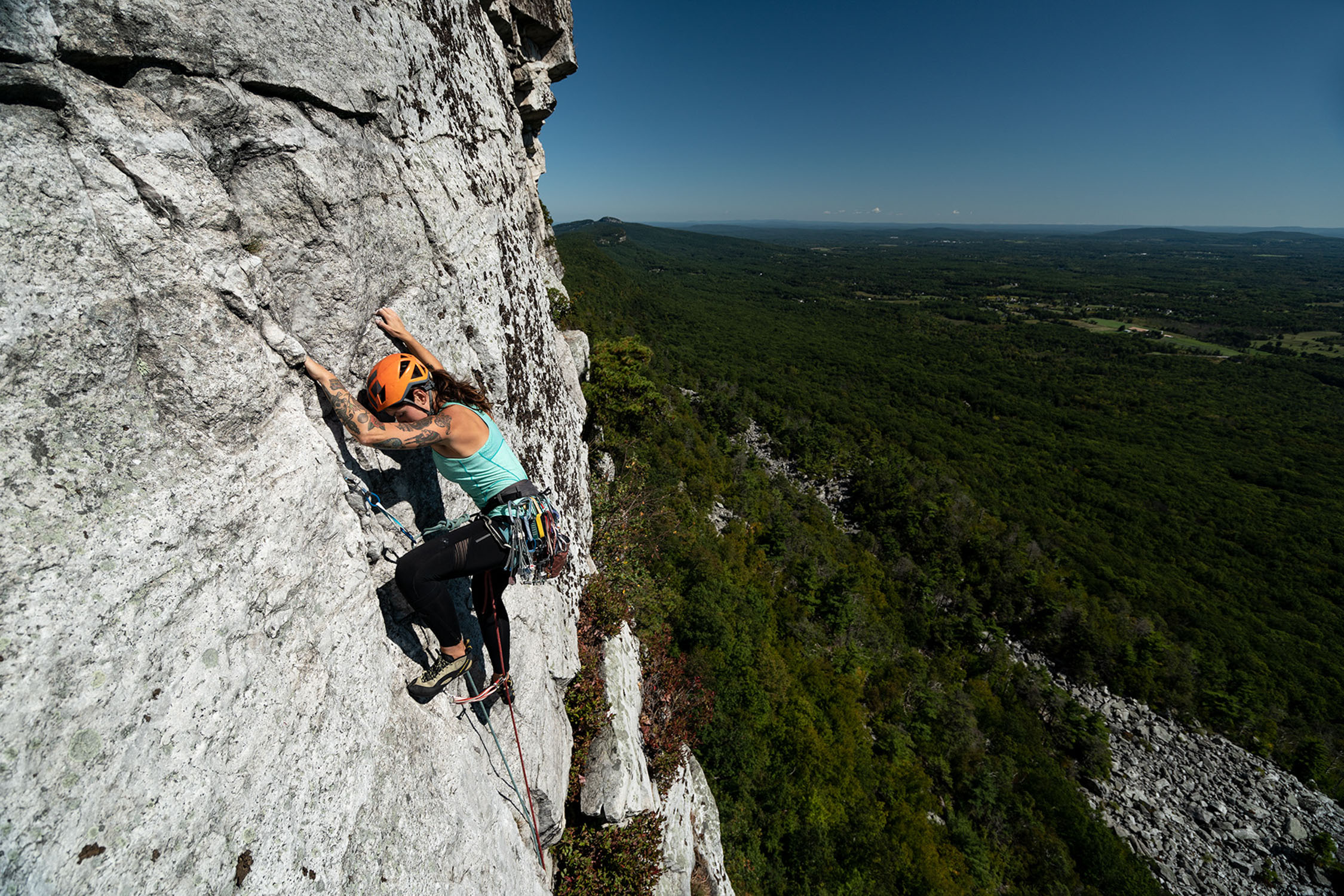
Cristal Cisneros, Instructor in the Trailblazer’s program at Women’s Wilderness
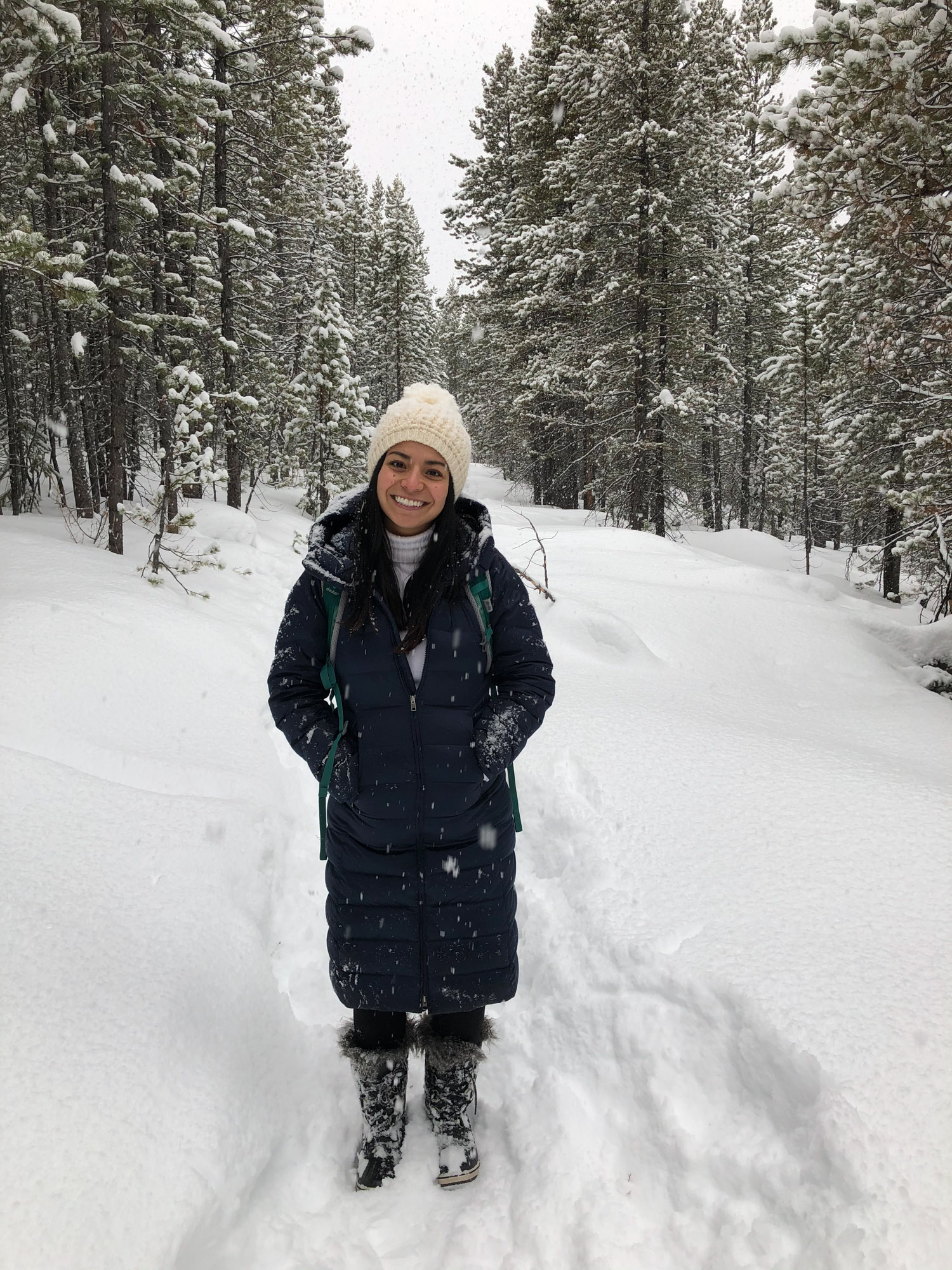
Ki’Amber Thompson – Founder & Director of Charles Roundtree Bloom Project
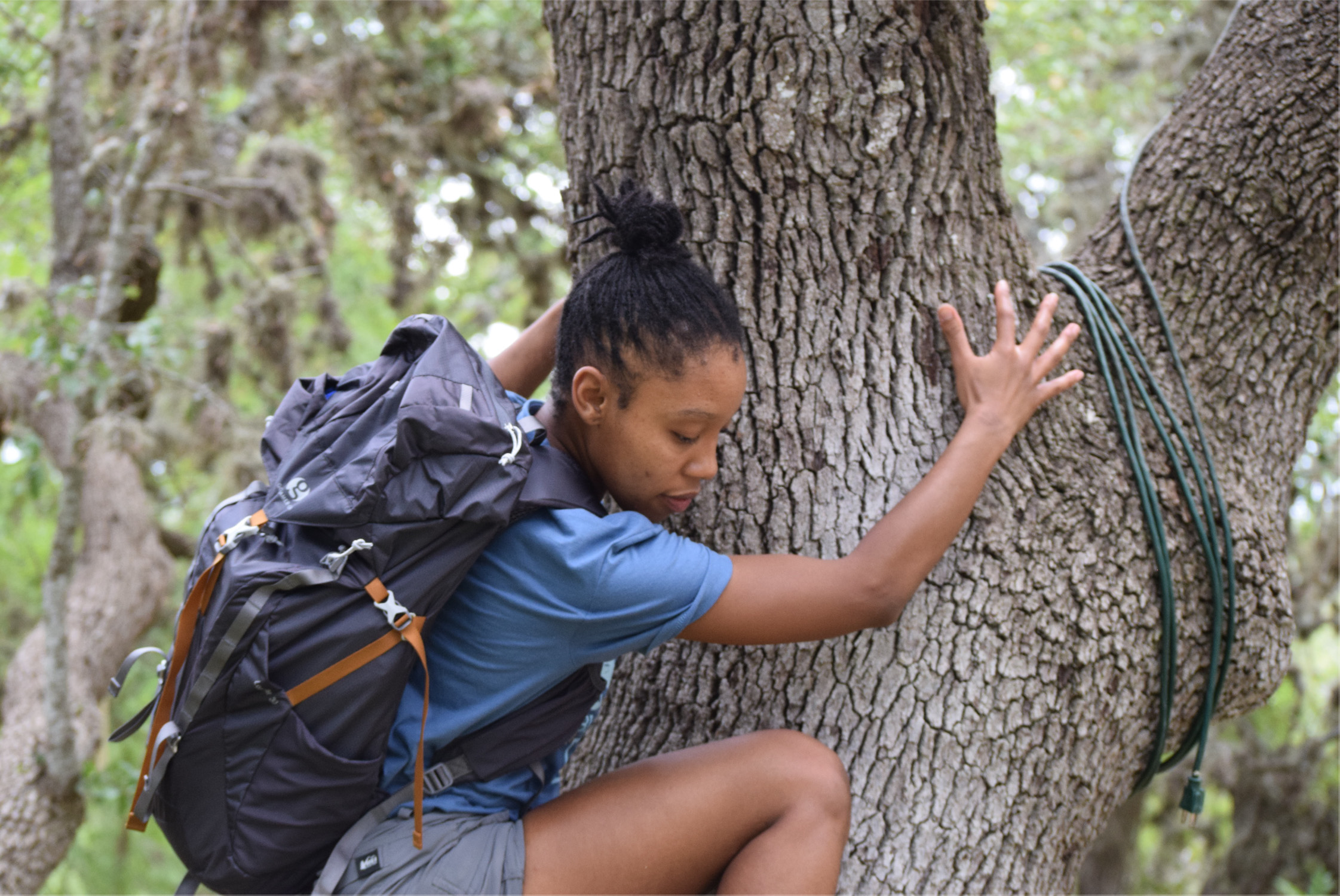
Ki’Amber Thompson
Karina Zavala
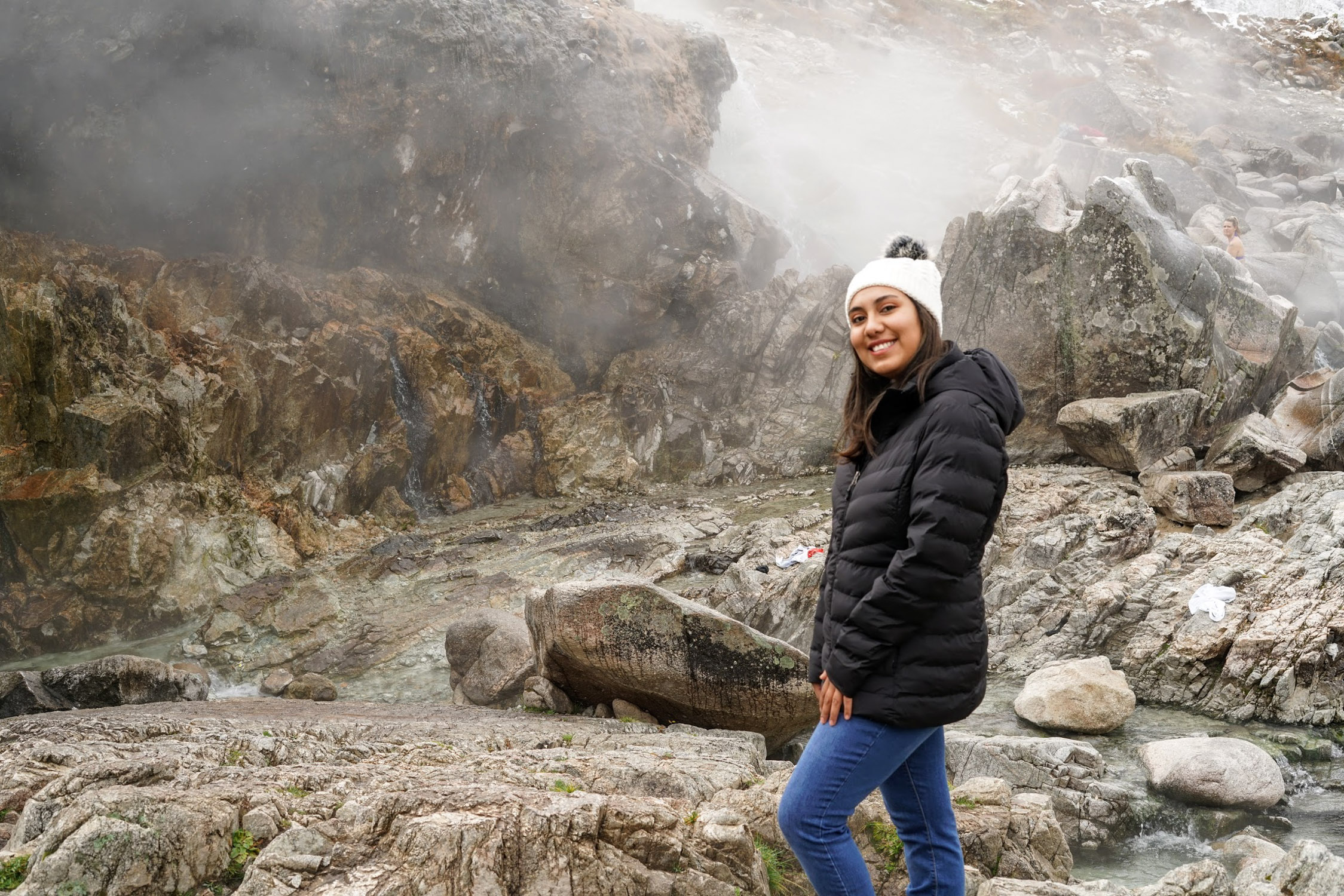
Karina Zavala
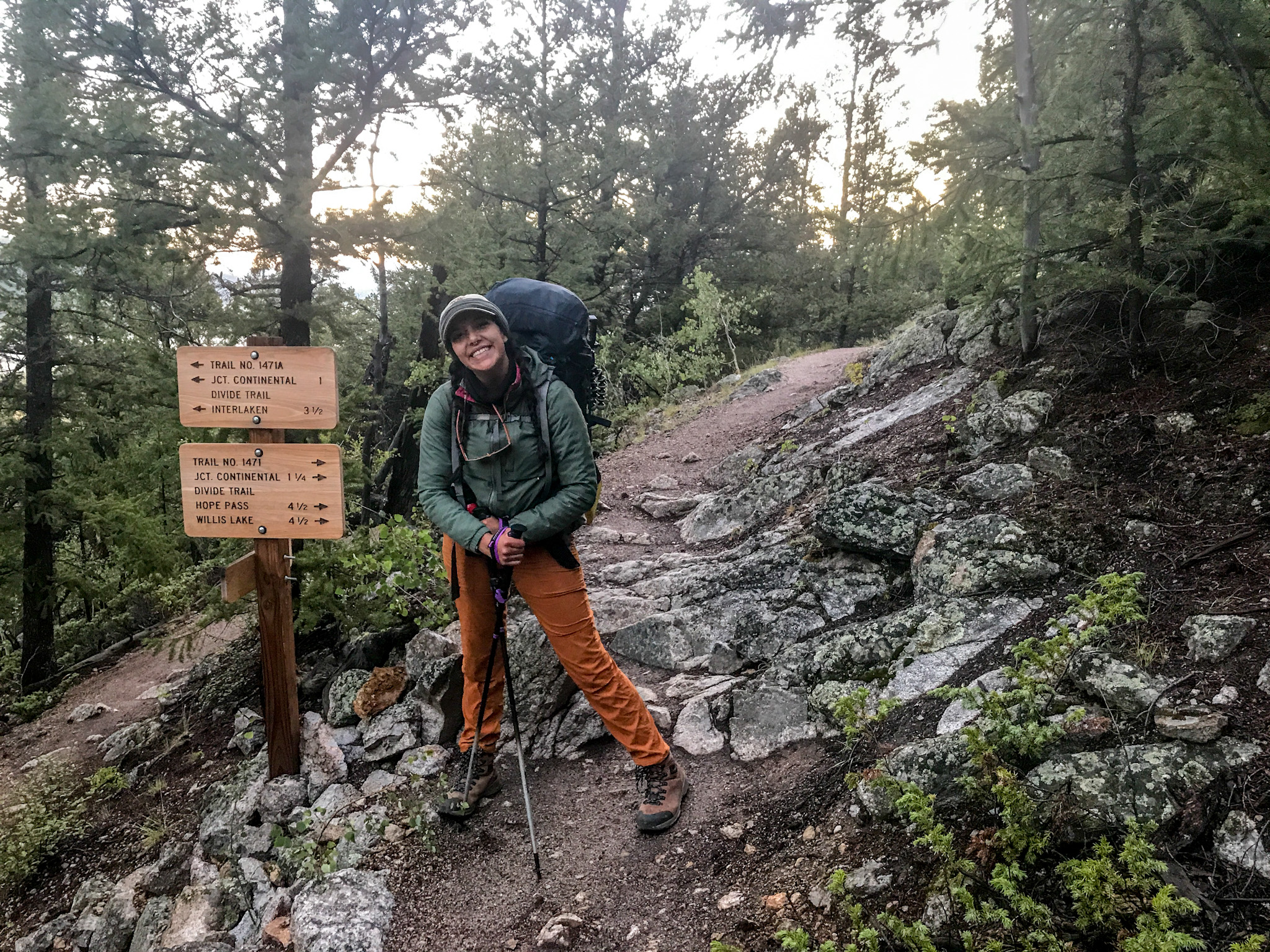
Backpacking in Colorado – Photo by Roberto Flores
TRANSCRIPT
Note: This transcript was lightly edited and created using a transcription service. As such it may contain spelling errors.
Gabaccia Moreno – Narration
Being outside as Black Indigenous or Women of Color, comes in various shapes and forms. Our mother tongues might not even be able to translate our relationships with nature for one another. Yet from the spiritual to the athletic, we have always been outside. Today is our moment to reconnect and redefine our ancient connections with the land. Tomorrow will be our time to celebrate the lessons learned along the way.
See Us Outside is a special four-part She Explores mini-series made in collaboration with The Cairn Project with support from the Walton Family Foundation. I’m Gabaccia Moreno, your guide in exploring the unique relationships girls and young women of color have with the outdoors, the forces outside of our control that sometimes keep us from pursuing time in nature, and the work of four organizations striving to create more access and opportunities for us to get outside. This is the final installment of the series, Episode 4: Looking to the Future, Today.
Before we look ahead, I want to take a moment to acknowledge the fact that’s been reiterated again and again throughout this series: We’re out here, today…
A voice memo we received helps tell this story:
Brandielee Johnson:
Hello. And my name is Brandy Lee Johnson based in New York city. I’ve been traveling ever since I was a little girl so far, I’ve been to 43 countries, seven continents, as well as Antarctica. And I love every minute of it. At the age of eight, I went to sleep away camp and did that to about the age of 21 years. And so I am very acclimated with the outdoors, but I would say that some positive aspects of spending time outside and being able to learn some new skills outdoors. It definitely made a great impact in my life. As far as me being able to communicate with people, knowing that I can face any challenge that may come my way. I learned so much about myself, whether that’s camping, rafting, rock climbing, bouldering, sleeping overnight. I’m really able to put any of those skills that I learned to the test and I truly do enjoy it.
Brandielee Johnson:
And I try to pass that on to other people that I meet. And I would also say that I enjoy going out tours with women of color. I feel that I’m in my element. I feel that I’m in my place and it’s almost as it’s a place that I belong when I am hiking or doing outdoor trips, women of color. It’s kind of like, you recognized them and you’re like, Hey, I see you. You see me? We here, Hey, we the only ones here. And so it allows you to feel more comfortable as opposed to being with other ethnic groups when you are on these hiking trips or overnight trips, which I’m definitely used to. But when you are in your element with women of color, it definitely sets the tone a little bit. And you’re saying, Hey, I’m here. You see me, I see you. We can do the same thing that they do. So what let’s go ahead and do it better. And so I think my hopes for the travel industry is that as women of color, we’re able to bring ourselves to the forefront of the outdoor communities so that we are seen and that we are heard, which is important because we do the same thing, but we’re not seeing. And I want us to be seen. And I want us to be heard. We got to get out there, women of color, and we have to hike.
Gabaccia Moreno – Narration:
Brandielee mentioned hiking as an example, but there are so many different opportunities for showing up as yourself outdoors. When I asked Cristal Cisneros, an instructor for the Trailblazers program at Women’s Wilderness, about her hopes for the future for girls and women of color outdoors, she emphasized that there is no set narrative. If you didn’t catch the earlier episodes in the series, Trailblazers is an outdoor program for women of color that is led by women of color. Here’s Cristal:
Cristal Cisneros:
My hopes is that they just find joy in being able to enjoy nature in whatever way they do personally. So if that gardening awesome, if that is backpacking amazing that that’s hiking kudos, if that’s rock climbing. So cool. You know, just like finding there’s no set definition of what other recreation should be. And I think I really want young women, girls of color to understand that there’s no set narrative of what it means to engage with nature. However, you feel authentic and engaging with nature. That is just as important as people climbing Mount Everest. So with the barbecues in your backyard, Hey, you’re outside. You’re enjoying fresh air. You love the sun. If that is what you feel is outdoor recreation in engagement with nature, I a hundred percent support that. So that’s the biggest thing is really encouraging young girls of color, women of color to change the narrative of what it means to be outdoorsy.
Gabaccia Moreno:
Oh, that was like a big hug to my heart. Thank you so much.
Cristal Cisneros:
Yeah.
Kriste Peoples:
Kriste Peoples, who is also an instructor for the Trailblazers program, really wants women to own our accomplishments and honor our bodies however they allow us to move through the natural world.
Kriste Peoples:
We are doing hard things and these hard things are part of the adventure and our bodies carry us over the roads and the trails and the mountains and the Hills. And we scale rocks and we climb mountains and we swim and we do all this stuff. And yet, Oh my goodness. I have lines up. I have a little bit of extra padding. Oh, it’s just me. I am so done with that because our adventures are our own and we, we need to honor them as such, without degrading them by, by saying, Oh, but yeah, well, we got to embrace the adventure because this is amazing. And our bodies are fantastic, you know, in whatever condition or whatever pace, whatever you deem is adventurous, get with it.
Gabaccia Moreno:
You know, I couldn’t agree with you more. I think there is a lot to be said about our culture in the ways that we carry this narratives of, I just did something that I have to apologize for, or that it’s not as good as someone else’s. So I’m not going to celebrate it fully.
Kriste Peoples:
Right? No more of that.
Gabaccia Moreno:
Yeah.
Gabaccia Moreno:
Looking into the future. What is your hope for girls of color when it comes to the outdoors?
Sarah Murray:
That they see themselves in it, you know, that everyone, not just folks that have a certain on that money in their bank account that have a certain color that feel like they fit into a certain concept of masculinity or femininity feel that that can be a refuge and, you know, a place to grow and be together in community with people and to feel whole, and to feel safe in a country where I think a lot of us right now on the backside of the past four years, do not feel safe. Uh, I want to see the outdoors become much more of an antidote.
Gabaccia Moreno – Narration:
This is Sarah Marie executive director of women’s wilderness. She goes on to stress that as much as representation is important, the work of nonprofits and programs like the ones you’ve heard feature throughout the series is crucial to changing the future of the outdoors.
Sarah Murray:
So I totally commend the activists that are helping to change the system, which I think really matter. And as well, the folks that are doing the direct service, because those things happen in order for the system to change. We have to look at policy, we have to look at private sector. We have to look at activism, which is really key, and it’s not the same thing as direct service. And so if there’s folks listening that want to think about where do they volunteer, where do they invest their money? Where do they invest their time? I just think it’s really important to look at the systems approach to this and that it’s, it’s great when there’s a woman of color on the cover of REI, we absolutely need that. REI is one of our partners. It’s amazing when we have an Instagram, you know, Patagonia, that’s talking about, you know, non-binary and folks in the outdoors so important. And if we don’t invest in direct service, that there’s going to be an incomplete picture here. We also have to make sure that backpacks are on backs that hiking boots are on for folks and new opportunities are created. And that’s a ground game that I think is sometimes an afterthought.
Gabaccia Moreno – Narration:
Karina Zavala, volunteer coordinator at Charles Roundtree Bloom Project, or the Bloom Project an outdoor organization that serves youth who are impacted by family incarceration, also talked about reducing barriers of access when I asked her about her hopes for the future:
Karina Zavala:
My hope is that all girls have the opportunity to experience the outdoors and that they have accessibility to transportation, outdoor gear, and to someone that can show them the outdoors or that can talk to them about the outdoors. My hope is that girls of color know that the outdoors is for them and that they don’t feel like they can’t go backpacking just because they think it’s not for them. And that’s my hope that, that someone is there for them and mentoring them.
Gabaccia Moreno:
What role do you hope that the Bloom Project plays into that future?
Karina Zavala:
Yeah. I see our organization growing in the near future and I see creating mentorships and partnerships to help girls have access to the outdoors and having someone to talk about the outdoor experience as a person of color and having, I think also the youth lead and be a part of the organization and deciding what they want the future to be like.
Gabaccia Moreno – Narration:
This communal approach to nature will make the outdoors more welcoming for more people breaking down colonizer, mentalities of conquering mountains and gatekeeping outdoor knowledge. Ki’Amber Thompson, Director and Founder of the Bloom Project shared her hopes for young people of color.
Ki’Amber Thompson:
For, yeah, for girls of color in the outdoors. I really hope that they come to see the outdoors as a space where they belong and are able to find the outdoors as a space of curiosity and adventure and healing, um, and find real connection there. And they’re able to, to build community in the outdoors access to nature is as a human. Right. And so, yeah, I just hope that girls of color are able to feel like they belong.
Gabaccia Moreno – Narration:
Yakuta Poonawalla sent in this beautiful submission sharing how her hopes are connected to her cultural background and the wisdom of her mother
Yakuta Poonawalla:
When I would come back from my time in nature, my mother was the first to use the word noon, an Arabic word, which means light a magical glow that surrounds your face. When you’ve had a deep and transformative experience of joy connection, liberation, perhaps an awakening. She would say that a Mopar [inaudible] [inaudible], that’s such an angelic glow on your face, just like heaven. As women we have to worry about so much when we plan our time in nature, will it be safe for me? Will I have other women for company will the male leader or facilitator of this outdoor trip, hear my voice and acknowledge my presence. Will the world see me as strong, courageous and bold with all these thoughts, weighing us down. Our news is invisible. It’s hard to feel it or sense it. My hope is that every single woman in this world can experience this Jeanette and have this noon without feel worry or anxiety. I’ll leave a haiku for all my women friends, you can shut us down, but we rise again daily with resilience
Gabaccia Moreno – Narration:
Building on this idea of belonging, Mira Manickam-Shirley, co-founder and executive director of Brown Girl Surf spoke of breaking down the invisible barriers that exist for women of color when it comes to seeing themselves outside.
Mira Manickam-Shirley:
I want to credit one of our volunteers, Jameela Hubbard, who she’s, the person who kind of shared this story. Her own story of she is a highly, highly, highly accomplished Black woman who her best friend became obsessed with surfing. And she would go to the, the beach and watch her friend surf. And without thinking that this was something she could do. And then at some point I think her friend convinced her to try it. And, and she, she sort of refers to that time when she was just sitting in the car watching as, as sort of this time where she had this imaginative barrier, that didn’t feel like this was just not something she imagined was for her. And I think what, what Brown Girl Surf does and what we want to grow and expand and make more widespread is this idea that this is for us.
Mira Manickam-Shirley:
And this is, uh, the, the ocean is for everyone. And, and to create just a sense of belonging and, and an understanding that we all deserve to be here, right? And this, this space belongs to us, belongs to everyone so that there’s no, there’s no imaginative barrier between here I am as myself and here I could be as a surfer that it just, it feels like something that, that you can step out and do if you are called. So, yeah, I think for Brown girl surf, we hope, you know, we hope to see a world where you can just drive to any surf break and just see tons of women and tons of girls and tons of girls and women of color and tons of people, of all ages and shapes and sizes and backgrounds. And that we as surfers all, I think embrace this idea of, you know, the ocean is, she is bigger than us and we need to take care of her. And, um, she is for all of us.
Gabaccia Moreno – Narration:
To know we can do or enjoy something, it’s in part a learned experience. If nobody tells us that we can, if it doesn’t occur to us that we can, if we don’t see others like us doing or enjoying activities like surfing, kayaking, backpacking, it’s less likely that we will be curious to try them. Michelle Kay submitted a voice memo which echoes these sentiments:
Michelle Kay:
When I was growing up, uh, what I wish someone had told me about spending time outdoors was that it was possible and that it was healing. And that it was for me and for people who look like me, I grew up in Alberta, Canada, where the nature is quite spectacular, but didn’t learn to enjoy it until I was an adult. My parents immigrated from Hong Kong where it is a very credit city. And they landed in Alberta where there is a lot of space in nature, but they didn’t take advantage of it. We were just never told that it was for us. We didn’t see people that looked like us that were out enjoying the outdoors. What I love about experiencing the outdoors with other women of color is this feeling of pure joy when we’re out hiking or cycling, or just being in the fresh air and the sunny skies, my hopes for the future and for the outdoor industry is to see more black indigenous women of color, gender non-binary folks, disabled folks in positions of power and not just an ad campaigns or commercials, but actually calling the shots and making decisions. Nobody owns the outdoors. It isn’t meant to be one particular group that are gatekeepers. Um, it’s meant to be shared and appreciated by everyone
Gabaccia Moreno – Narration:
In a year when the organizations featured in this series were not able to meet in person like they normally would, looking to the future also comes with an extra layer of appreciation for getting to uplift each other and nurture community face to face. Alexis Krauss, co-founder of Young Women Who Crush, shared this sentiment when I asked her about her hopes:
Alexis Krauss:
Oh, I mean, I think, I guess, you know, I’m just, I’m really grateful that we’ve all been trying to find these, these silver linings to this pandemic. And, you know, we were out together past Saturday
Alexis Krauss:
On this beautiful, beautiful day, um, chilly, but sunny day. And, and we had about seven, seven mentees and about five mentors out. And we just had this moment where like, against all odds, like we were here, we were here, we made this happen. And, you know, I was thinking about one of our mentees, Kristin, and she lives down in South Brooklyn. And so she walked 20 minutes to the subway station. She left her house at four 30 in the morning and, you know, walk to the subway station and had to wait for the subway to start running and then was on the train for over an hour. And then she met at the gym and then she got in the van and drove two hours to go rock climbing. And like just the amount of effort sometimes that it takes to like get to these places and the commitment that it takes.
Alexis Krauss:
And like, it’s, like I said, it’s always like against all odds against like a pandemic and just all of these challenges, like we’re all here. And that’s how much this program matters to all of us. Like, we’re, we’re here, we showed up and I don’t know that without the pandemic, like that sort of understanding would have been possible. And so I think now, like we’ve always been really grateful for our time together, but now like even more when we have those in-person moments, it’s just feels so, so incredibly powerful. And I just cannot wait to like get out West and, you know, like we just want to, like, we want to take, we want to go climbing all over the, all over the world and all over the country. And I think, I think we have that, um, potential. So yeah, I’m just really excited for where we’re going to go.
Alexis Krauss:
And I’m so excited to see what, you know, a lot of our girls are in college now, or they’re graduating high school and I’m just so excited to see like what they do and how they share those gifts with the world. And they’re already, you know, starting their own climbing clubs and bringing, you know, diversifying climbing in their, and their spaces, um, now. And so I just can’t wait to see what they do next. Oh, I can’t wait to see either. I mean, I just read a few of the stories on, on your website. And I was, you know, as a person that grew up somewhere where there’s no rug climbing, I thought what an amazing opportunity to just be faced with, with the opportunity and be able to not only have a space where you can go practice, but also to get outside and go on a wall and share the experience with, with other women. That just sounds fabulous. Yes. So, you know, it’s, it’s, it is. And, um, we’re just, we’re really invested. We’re really invested in the program and, and, um, and I’m just excited to see where we go and what adventures we go on
Gabaccia Moreno – Narration:
Learning about the work of organizations like Young Women Who Crush, Women’s Wilderness, Charles Roundtree Bloom Project, and Brown Girl Surf, has shown me that the hopes for the future we all want for Women of Color in the outdoors are filled with excitement and action. Arlene shared a submission telling us what she hopes will change from industry leaders to create momentum for a more inclusive outdoor culture.
Arlene:
My hopes for the outdoor industry and outdoor recreation is that I hope they create an environments and put in the work to make it more inclusive for everyone. I hope that young girls and women of color when they’re entering and when they’re starting to explore the outdoors, that it’s more inclusive for them that they’re able to see people like them on social media accounts, on magazines, you know, for the outdoor at REI, that they feel like they are welcoming this place because growing up, I didn’t get to see that. So I hope for them, it changes and they feel like it doesn’t matter what color you are, what background you’re from. You are considered a real outdoors man, a real outdoors woman. I just hope that that changes for us. And I can’t wait to see what the future has in store for, for all of us in the outdoor industry.
Gabaccia Moreno – Narration
Our experiences outdoors as Black, Indigenous, or Women of Color are far too layered, too complex, their roots running so deep, that we are able to just scratch the surface of it in four episodes. But, to the WOC listening, I hope you felt heard, found comfort and hope in this series. And for everyone else, I hope that from now on, whenever you see a Woman of Color outside, that you have a deeper appreciation for her presence. And before we say goodbye, I want to invite you to find and reflect on your own role in all of this, and get to know us, take us with you, amplify us, defend us, believe us, listen to us, respect us, and see us, outside.
Be the first to comment